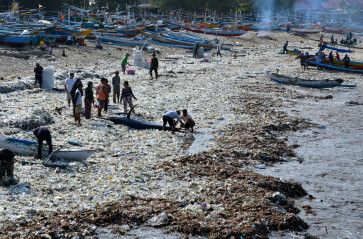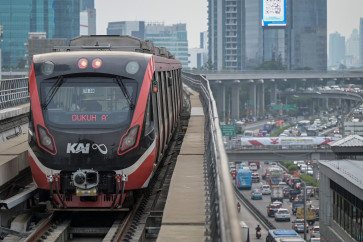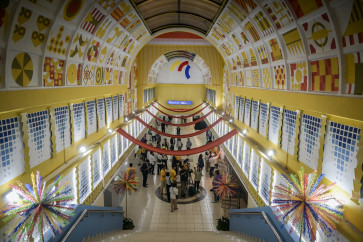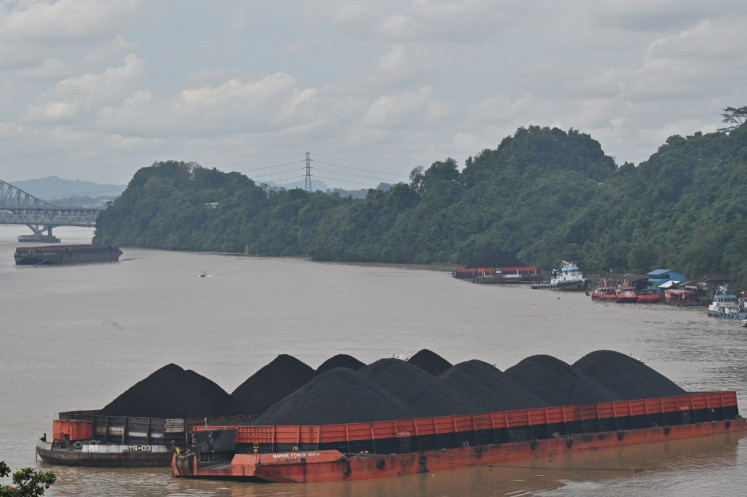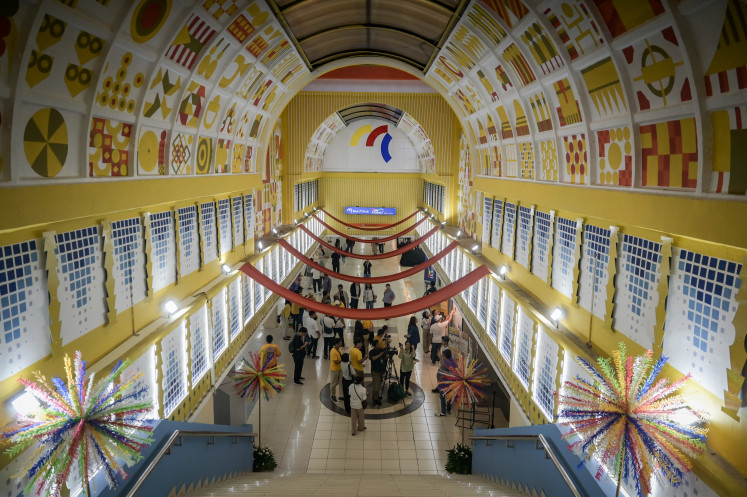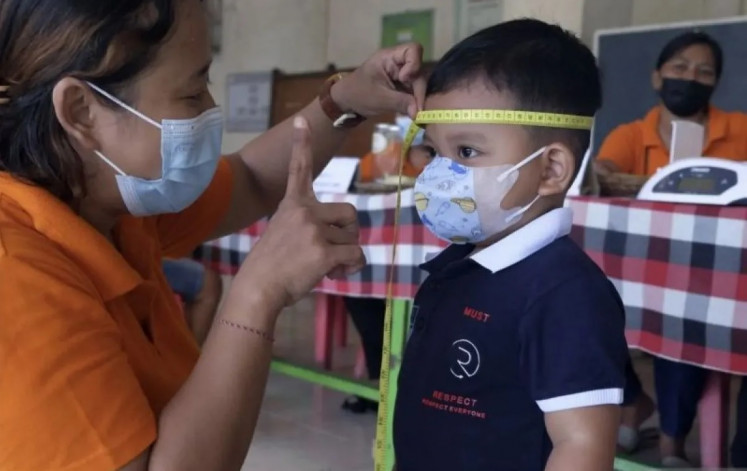Jokowi, Albanese hail ‘heartfelt’ meeting
Neighbors must remain communicative regardless of external factors, analyst says.
Change text size
Gift Premium Articles
to Anyone
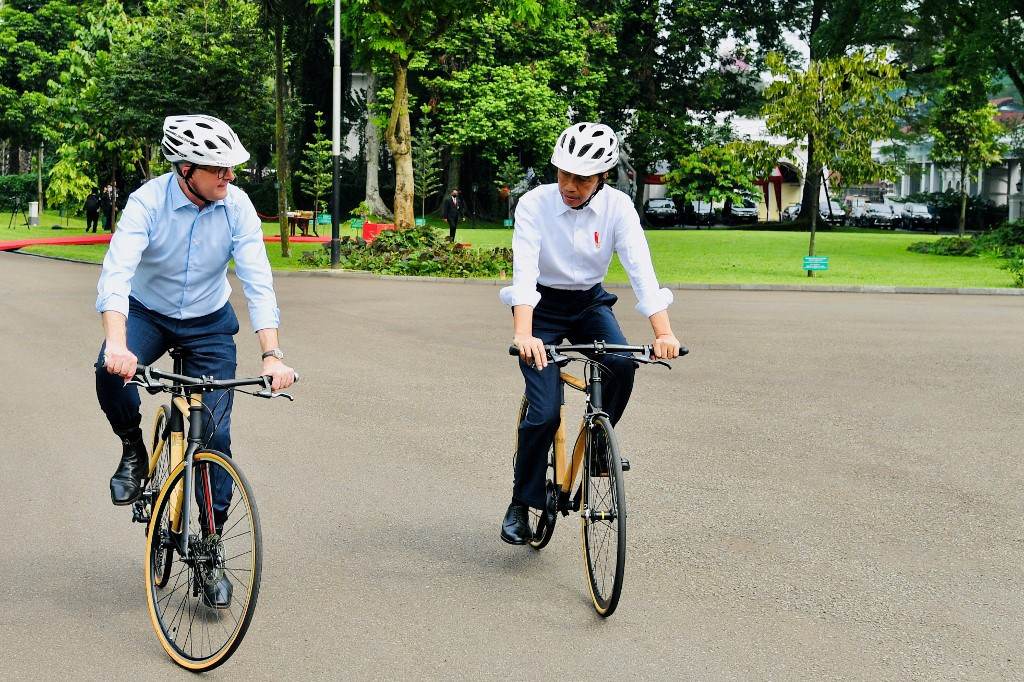
A
ustralia’s Anthony Albanese received on Monday a warm welcome upon the start of his first official visit to Indonesia as prime minister, marked by President Joko “Jokowi” Widodo’s invitation to cycle through a kilometer-long track using bamboo bicycles in the Bogor Palace compound, West Java.
His visit continued an ongoing tradition between leaders of the two neighbors to have their personal relationship reflect the wider state of their countries' bilateral partnership, which Albanese aspired to fortify as part of his winning election campaign pitch.
“Australia’s relationship with Indonesia is one of the most important. That is why I was determined to make this my first bilateral visit, just two weeks as prime minister,” Albanese said during a press conference in Jakarta after the leaders’ meeting.
Their ties have been defined by some as a love-hate relationship, with stretches of stable cooperation disrupted by testy incidents, most recently when Canberra surprised Jakarta by teaming up with the United States and the United Kingdom in a security alliance that promises them a nuclear-powered arsenal.
This time, however, economic cooperation was a unifying factor.
The Labor government leader highlighted the fact that Indonesia was “on track” to be one of the world’s five largest economies, and that Albanese saw “an enormous opportunity” to expand partnerships.
“Revitalizing our trade and investment relationship is a priority for my government,” the prime minister said during his speech at the Bogor Palace.
Albanese’s Jakarta-bound trip was accompanied by Australian Trade Minister Don Farrell, Foreign Minister Penny Wong, as well as key business leaders. They were also scheduled to meet with senior Jokowi aide Luhut Pandjaitan and ASEAN Secretary-General Lim Jock Hoi in Jakarta, before heading to Makassar in South Sulawesi.
Jokowi said in his own remarks that he had talks with Albanese that focused “mostly on economic cooperation”.
“Indonesia and Australia have a strong bilateral foundation, namely the Strategic Comprehensive Partnership from 2018 and the IA-CEPA [Indonesia-Australia Comprehensive Economic Partnership Agreement],” the President said.
Indonesia sends a significant number of university students and business interests to Australia, underpinned by the IA-CEPA signed in mid-2020 aimed at strengthening value chains between Australian and Indonesian businesses. Jokowi highlighted specifically three main pointers for economic synergy: trade, vocational opportunities and education.
“Firstly, I have conveyed [to Albanese] the importance of broadening export access for Indonesian products to Australia with higher added value, such as automobiles,” he said while referencing the 2 million Indonesia-made Toyota Fortuner SUVs exported to Australia in February.
“Secondly, I hope for the implementation of IA-CEPA relating to Indonesian citizens’ opportunity to work in Australia, including increasing the working holiday visa quota to 5,000 receivers annually. Third, collaborations on education and health care."
Beyond Java
Albanese’s trip to Makassar scheduled for Tuesday demonstrates that Australia’s vision in Indonesia goes beyond Java, the prime minister declared.
“[Going to] Makassar is a symbol that Australia understands that Indonesia is more than Jakarta and Bali. It is a vast archipelago. It is diverse and covers a wide area of geography,” he said.
Dewi Fortuna Anwar, research director for the Habibie Center, told The Jakarta Post on Monday that this plan to look further “east” is not particularly new coming from the Australians, whom she described as “having elaborate plans for Indonesia”.
“This focus to the east has been in the making for a while, which is good news to these places that are typically overlooked even by the Indonesian government. That development is going to finally reach non-Javanese places is a good thing,” said Dewi.
The Labor leader also reaffirmed his eagerness to collaborate with Jakarta on tackling climate change and asserting ASEAN’s centrality in the region, while also confirming his attendance at the Group of 20 Summit this year — despite Russian President Vladimir Putin’s intention to attend the meeting.
“I am sitting with President Widodo, not President Putin. The Indonesian presidency of the G20 is important. A lot of preparation had been done,” said Albanese.
A fresh ride
The visit to Indonesia was weaved with amiable gestures and cozy hospitality from Jokowi, who gifted the prime minister with a bamboo bicycle – a symbol for sustainable transportation, Jokowi said – that was made in Central Java. A similar gesture was made by both leaders’ predecessors to troubling effect.
The two enjoyed the morning by cycling through the palace wing of the Bogor Botanical Garden, a moment described as “heartfelt” by Albanese.
“We got along exceptionally well, I must say, and it was a warm welcome,” he added during the press conference.
A good personal relationship between the neighboring leaders is key in determining the overall theme of the Indonesian and Australian relationship, said Dewi, adding that the sheer proximity between the countries demands diplomatic cooperation.
“Regardless of any external factors, Indonesia and Australia will always need to be communicative with each other. Whether that communication is cold, friendly, personal or formal – that wholly depends on how the leaders bode well,” she said.
While Labor’s focus typically revolves around human issues like rights and climate change, Dewi noted that there will not be any significant policy changes with regard to Indonesia amid the transition from Scott Morrison’s administration.
“Australian issues, such as climate change and human rights, tend to be bipartisan. Differences are not substantive, rather in style or approach,” said Dewi, adding that the Papua issue will most likely not affect Albanese’s inclination to Indonesia.
Though their meeting was dominantly marked by economic talks, the two leaders also discussed strengthening cooperation in terms of security amid global insecurity following Russia’s invasion of Ukraine. Albanese claimed he had not talked about China’s presence in the Pacific with Jokowi.
“Australia and Indonesia will have different foreign policies with different countries. We have different histories. Australia has always had a strong pillar with the United States. Indonesia has been different; we respect that,” he said.

